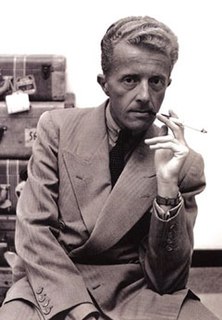A Quote by Percy Bysshe Shelley
Belief is involuntary; nothing involuntary is meritorious or reprehensible. A man ought not to be considered worse or better for his belief.
Quote Topics
Related Quotes
Tears may be considered as the natural and involuntary resource of the mind overcome by some sudden and violent emotion, before ithas had time to reconcile its feelings to the change in circumstances: while laughter may be defined to be the same sort of convulsive and involuntary movement, occasioned by mere sur prise or contrast (in the absence of any more serious emotion), before it has time to reconcile its belief to contradictory appearances.
The man who has a certain religious belief and fears to discuss it, lest it may be proved wrong, is not loyal to his belief, he has but a coward's faithfulness to his prejudices. If he were a lover of truth, he would be willing at any moment to surrender his belief for a higher, better, and truer faith.
They have their belief, these poor Tibet people, that Providence sends down always an Incarnation of Himself into every generation. At bottom some belief in a kind of Pope! At bottom still better, a belief that there is a Greatest Man; that he is discoverable; that, once discovered, we ought to treat him with an obedience which knows no bounds. This is the truth of Grand Lamaism; the "discoverability" is the only error here.
Religion becomes a matter of belief, and belief acts as a limitation on the mind; and the mind then is never free. But it is only in freedom that you can find out what is true, what is God, not through any belief; because your belief projects what you think God ought to be, what you think ought to be true. If you believe God is love, God is good, God is this or that, your very belief prevents you from understanding what is God, what is true.
It is a fool only, and not the philosopher, nor even the prudent man, that will live as if there were no God... Were a man impressed as fully and strongly as he ought to be with the belief of a God, his moral life would be regulated by the force of belief; he would stand in awe of God and of himself, and would not do the thing that could not be concealed from either.
Breathing is important in the practice of meditation because it is the faculty in us that is simultaneously voluntary and involuntary. You can feel that you are breathing, and equally you can feel that it is breathing you. So it is a sort of bridge between the voluntary world and the involuntary world — a place where they are one.
Until the content of a belief is made clear, the appeal to accept the belief on faith is beside the point, for one would not know what one has accepted. The request for the meaning of a religious belief is logically prior to the question of accepting that belief on faith or to the question of whether that belief constitutes knowledge.
Belief comes spontaneously as well as by effort. Belief is power. An insincere and uninspired seeker is aware of the truth that belief is power, but he cannot go beyond understanding or awareness; whereas a sincere, genuine, devoted and surrendered seeker knows that belief is dynamic power, and he has this power as his very own.







































